|
|
|
Sort Order |
|
|
|
Items / Page
|
|
|
|
|
|
|
| Srl | Item |
| 1 |
ID:
083205
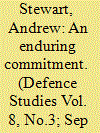

|
|
|
|
|
| Publication |
2008.
|
| Summary/Abstract |
The British military deployment to Sierra Leone in May 2000 marked therenewal of a long historical connection between the two countries. As aformer British colony, from 1829-1961 the authorities in London wereresponsible for providing the administration and governance of their WestAfrican territory as well as safe-guarding its security. This entailed thecreation of a dedicated local military structure, mixing local troops withseconded British officers to guard the frontiers of the small country againstboth external and internal threats. Although in a much revised form, thismission appears to have been now once again renewed.
|
|
|
|
|
|
|
|
|
|
|
|
|
|
|
|
| 2 |
ID:
092681
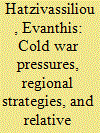

|
|
|
| 3 |
ID:
096516
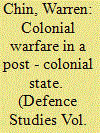

|
|
|
| 4 |
ID:
085122
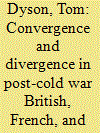

|
|
|
|
|
| Publication |
2008.
|
| Summary/Abstract |
Post-Cold War military reforms in Britain, France, and Germany have been characterized by patterns of convergence in the objectives, instruments, and institutional forums of defense policy but by divergence in temporality. These patterns of convergence and divergence cannot be fully explained by cultural approaches. Neither can they be explained solely by a focus on the role of international structure, as neo-realism posits, although the post-Cold War distribution of capabilities is driving Britain, France, and Germany toward policy convergence. Instead, the analysis builds upon the insights of neoclassical realism. Culture emerges not so much as a cause of action as instrumental and a resource for policy leaders in the domestic political and temporal management of reform.
|
|
|
|
|
|
|
|
|
|
|
|
|
|
|
|
| 5 |
ID:
096561
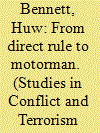

|
|
|
|
|
| Publication |
2010.
|
| Summary/Abstract |
The British campaign in Northern Ireland in the early 1970s is often portrayed as consistent in its repressive character and its failure to successfully relate military means to political ends. This article argues that British military strategy was adaptable, alternating between defensive and offensive means depending on the changing political context. The low profile policy allowed the army to consolidate a firm basis for later offensive operations against the Provisional Irish Republican Army (PIRA). This proved successful because it contrasted with Republican violence and was contextualized within the government's willingness to negotiate and compromise when necessary.
|
|
|
|
|
|
|
|
|
|
|
|
|
|
|
|
| 6 |
ID:
092071


|
|
|
|
|
| Publication |
2009.
|
| Summary/Abstract |
Although a great deal has been written about British policy in the Middle East in the late 1940s and early 1950s, the reorganization of the Southern flank of Supreme Headquarters Allied Powers Europe after the admission of Greece and Turkey into the North Atlantic Treaty Organisation and the assumption of NATO's naval Mediterranean Command by Britain has attracted little attention. This article analyses British aims and policy on the formation of the Mediterranean Command, the talks between London and Washington concerning the appointment of a Naval Commander-in-Chief, the attitudes of France, Italy, Greece, and Turkey towards British policy, and finally, the establishment of NATO's Mediterranean Command in conjunction with the reorganization of SHAPE's Southern flank. For strategic as well as prestige reasons, Britain tried to retain its traditional dominant eastern Mediterranean position by encouraging the establishment of an Allied naval Mediterranean Command under a British Commander-in-Chief. However, the decline of British military and naval power and political influence meant that Britain secured a compromise settlement which only partially satisfied its aspirations.
|
|
|
|
|
|
|
|
|
|
|
|
|
|
|
|
| 7 |
ID:
114389


|
|
|
|
|
| Publication |
2012.
|
| Summary/Abstract |
There is a growing discussion of the concept of 'influence' in British military circles. It potentially offers a way of doing more with less in an era of conflict amongst the people. But rather than being an entirely radical new idea, influence is part of a long tradition of manoeuvrist British military thinking on the conduct of war. The challenges are, argues Alexander Alderson, to ensure it is seen as part of that continuum, and to ensure its appropriate application by a broad base of practitioners through a standardised approach - and one rooted in the British Army's fundamental ethos of manoeuvre.
|
|
|
|
|
|
|
|
|
|
|
|
|
|
|
|
| 8 |
ID:
127372
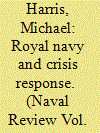

|
|
|
| 9 |
ID:
095063
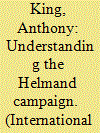

|
|
|
|
|
| Publication |
2010.
|
| Summary/Abstract |
British forces are now engaged in a major operation in southern Afghanistan, the outcome of which is likely to be strategically decisive-especially for the configuration and status of Britain's land forces. Although progress seems to have been made, there has been much criticism of the campaign. Through an analysis of the three-year Helmand mission (Operation Herrick), this article explores whether, for all the improvements in the campaign in terms of resources and numbers of troops, the basic structure of the campaign established in 2006 has endured. Instead of focusing on an 'ink-spot' from which to expand, British forces have tended to operate from dispersed forward operating bases from which they have insufficient combat power to dominate terrain and secure the population. They are consequently engaged in a seemingly endless round of high-intensity tactical battles which are normally successful in themselves but do not contribute to the overarching security of the province. The analysis explores the way in which this distinctive campaign lay-down-the preference for dispersal and high-intensity fighting-may be a reflection of British military culture and its military doctrine. By highlighting potential unacknowledged aspects of the British military profession, the article aims to contribute to debates about the development of the armed forces.
|
|
|
|
|
|
|
|
|
|
|
|
|
|
|
|
|
|
|
|
|